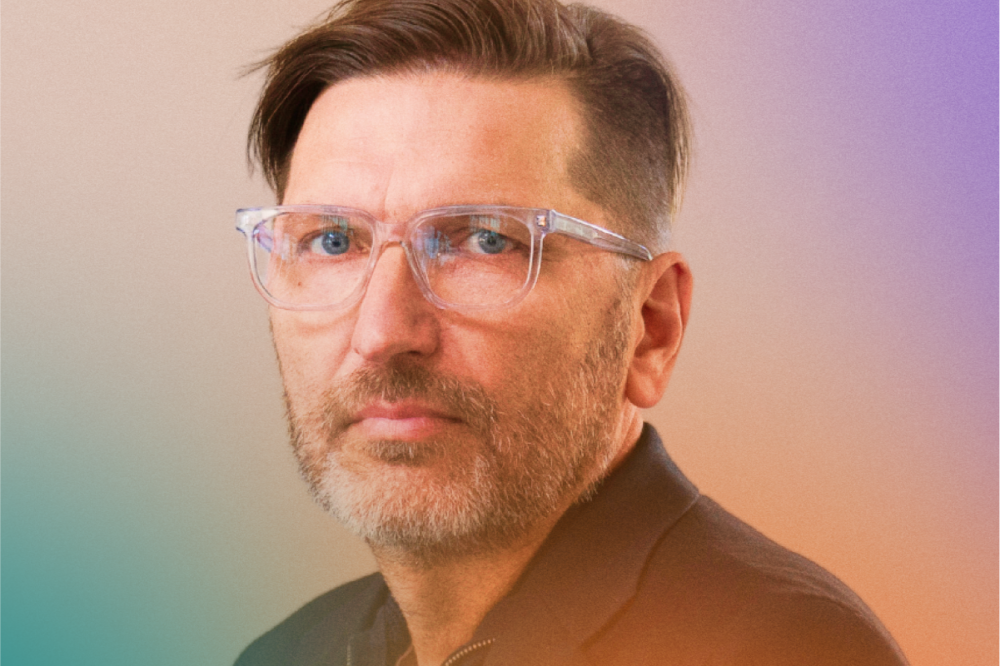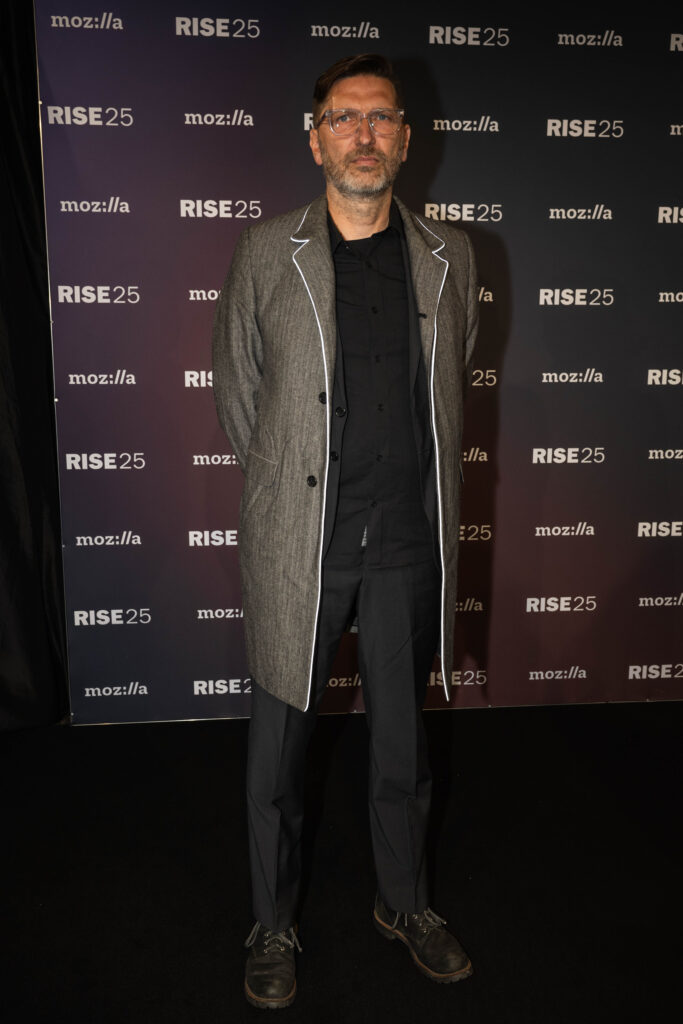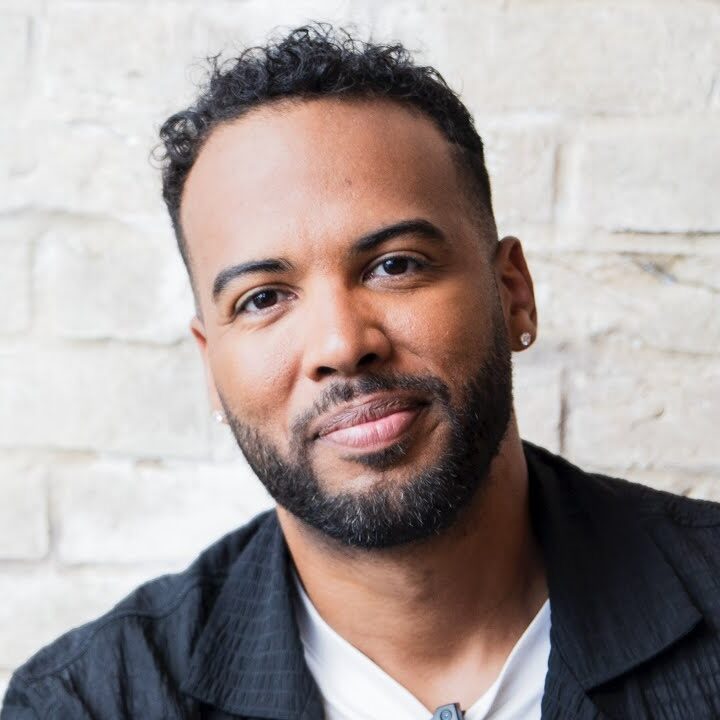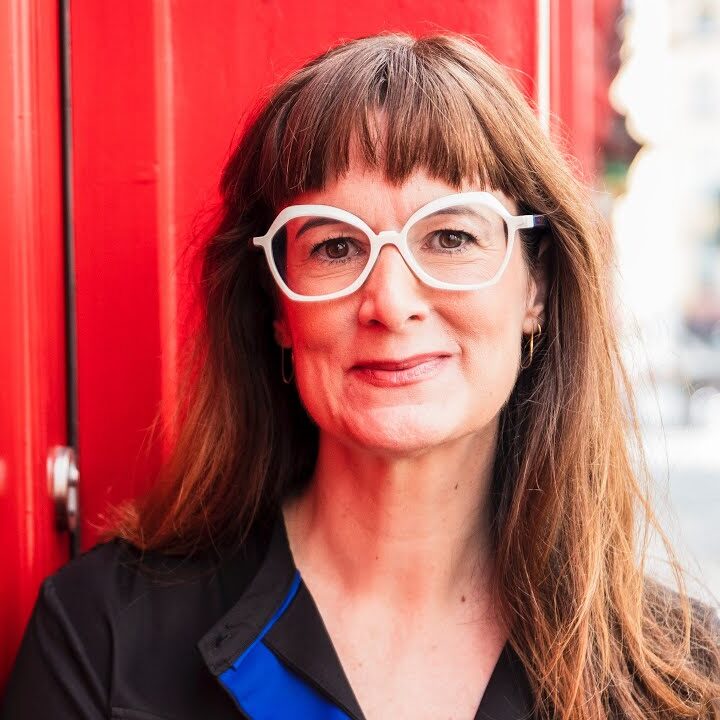
Marek Tuszynski reflects on curating thought-provoking experiences at the intersection of technology and activism
At Mozilla, we know we can’t create a better future alone, that is why each year we will be highlighting the work of 25 digital leaders using technology to amplify voices, effect change, and build new technologies globally through our Rise 25 Awards. These storytellers, innovators, activists, advocates, builders and artists are helping make the internet more diverse, ethical, responsible and inclusive.
This week, we chatted with Marek Tuszynski, an artist and curator that is the Executive Director and co-founder of Tactical Tech, a program dedicated to supporting initiatives focused on promoting better privacy and digital rights. We talked with Marek about his travels abroad shaping his career, what sparks his inspiration and future challenges we face online.
So the first question that I had that I wanted to ask you about this is very straightforward, but what initially inspired you to co-found Tactical Tech? What was the first thing that made you really want to start the work that you do?
Marek Tuszynski: Things were not looked at the ways that I thought it’s important to look at them, especially technical things that have been around for over 20 years now. But the truth is, it was actually more excitement. Excitement that there’s such a massive opportunity, such a massive chance for many different people — actors, places, nations — to do things different and outside of the constraints that they are in, where they are at the time, and so on. I worked internationally at the time in sub-Saharan Africa and Southeast Asia and was just thinking that a lot of tech is being damned there in these places — I’m also from Eastern Europe, so we’ve never seen the leading edge of the technology, we’ve seen the tail if we’re lucky if the censorship allowed. So I just wanted to use technology as not only an opportunity that I have been kind of given by chance — it just happened I was in the right place in the right time — but also to bring it, and to co-develop it and do things together with people. My focus early on was with open source with software, and that was the driving force behind how we think about which technology is better for society, which is a more right one, which gives you more freedoms, not restrict them, and so on, etc. The story now, as we know, it turned kind of dark, but the inspiration was fascination with the possibilities of technology in terms of the tool for how we can access knowledge and information, the tool for how we can refine the way we see the world. It’s still there, and I think was there at the very beginning, and I think that’s a major force.
You mentioned some of the traveling that you did. I’m very much of the belief that traveling is one of the best ways for us to learn. How much did the traveling and the places that you’ve been to and that you’ve seen influence or impact the work that you did and give you a bigger perspective on some of the things that you wanted to do?
That’s interesting because I come from the art background and one of my fascinations was a period in history of ours where some of the makers spent some of their time when they were learning on traveling. To go and visit other artists or studios, vendors and makers, etc., to see how they do things because there was no other way of information to travel, and for me that was very important. But I think you are right. It is not cool to talk about traveling these days, because travel also means burning fossil fuels and all this kind of stuff — which is unfortunately true, but you can do other travel, I’m doing a lot of sailing these days. But the initial traveling for me, coming from an entirely restricted part of the world and where I was growing up, I actually thought, “I’m never going to travel” in my mind. This is like something I’m going to read in the books, see on films, but never experience because I can’t get a passport. I couldn’t get the basic rights to leave the border that I was constrained with. So the moment I could do that I did it, and I practically never come back. I’ve left the place I’m from 35 years ago.
The question that you’re asking is very important because travel teaches you a lot of things, and you become much more humble. Your eyes and brain and heart opens up much more. And you see that the world is unique, that people around you are unique — you’re not that unique yourself and there’s a lot to learn from that. Initially, when you travel, you have this arrogance — I had this arrogance at least — that I’m going to go to places, learn them, understand them, and turn into something, etc. And then you go, and you learn, and you never stop. Learning is endless, and that’s the most fascinating part. But I think that the biggest privilege was to meet people and meet them on their own ground with their own ideas about everything. And then you confront yourself and rip the way you frame things because you just come from a place with ideas that somebody else put into your education system. So for me, yeah, it (traveling) worked in a way. And it’s not necessarily the travel in the physical space that we need. Now you can do it virtually like we have the conversation, and you get to know people and, you travel in some way. You may not see the actual architecture of the space you are in, but you are seeing “Okay, this is a person coming from somewhere with a certain set of ideas, questions, and so on, etc.” You look at them and think how we can have the conversation knowing that we come from very different places. Travel gives you that.
When it gets to like some of the ideation process, what sparks the inspiration for the experiences you try to create? Is there any research or data that you look at? Are there just trends that you look at to get inspired by? What kind of like starts that?
There’s a mixture. I think we’re probably the least analyzing organization. Even if it’s a trend or some kind of mainstream stuff with the social media or all media, etc., it’s too late. I think for me personally, it’s always observing what’s being talked about. With AI, it’s what aspects of AI actually are being totally omitted. There’s a lot of focus now, for example, on elections and the visible impact of the AI, so how we can amplify this information, confusion and basically deteriorate trust into what we see, what we hear, what we read. And it’s super important. People are going to learn that very quickly.
I think what is happening is the invisible part, where businesses that are interested in influencing political or non-political opinions around issues that are critical for people will be using AI for analyzing the data. For hyper fast profiling of people in much more clever ways of addressing them with more clever advertisements, in that it won’t necessarily be paid — it doesn’t have to be. Or even how you design certain strategies, etc. that can be augmented by how you use AI. And I think this is where I will be focusing on rather than talking about that the deepfakes which we’ve done already. But to the core of the question you asked about how we have topics that we focus on, from the first day of Tactical Tech, we’ve always based our work on partners, collaborators and people that we work with — and often that we are invited to work with like a group of people or institutional organizations, etc. And good listening is for me part of the critical research. So instead of coming in a view and ideas of research questions, we listen to what questions are already there. Where the curiosity is, where the fears are, where the hopes are, and so on, and sometimes start to build backwards toward and think about what you can bring from the position you occupy.
Is there one collaboration or organization that you’ve worked with before that you felt was really impactful that you’re the most proud of?
There are hundreds of those (laughs). We had this group of people from Tajikistan — many people don’t know what Tajikistan is. And they were amazing. They were basically like a sponge, just sucking everything in and trying to engage with the culture cross between us and them and everybody else and people from probably other countries and so on — it was massive. But everybody was positive and trying to figure out some kind of common language that is bizarre English being mixed with some other languages, and so on. And that first encounter turned into a friendship and collaboration that led them to be the key people that brought the whole open source tool to the school system in Tajikistan, and so on, etc. I think that was one of these examples where it was very positive, encouraging.
We do a lot of collaboration. So we have hundreds of partners now, especially on our educational work. And I think the most successful series was with a number of groups in Brazil that we collaborated with because they really took the content and the collaboration to the next level and took ownership of that. And for me, the ideal scenario over the work we do is that we may be developing something on the stage together, but there should be a moment when we disappear from the stage and somebody else take that stage. And that’s what happened. And that’s just beautiful to see. And when somebody tells you about this product that is amazing, and they don’t even know that you were part of that, that is the best compliment you can get.

What do you think is the biggest challenge we face in the world this year on and offline? How do we combat it?
I think people have different challenges in different places. The first thing that we are going to launch is a series of election influence situation rooms, which is just kind of a creative space that has the front of the house and back of the house that you would like to mount around some of the elections that are happening — like U.S. or European Parliament, or many other elections. What we would like to showcase and kind of demystify is not only the way we elect people, but how much the entire system works or doesn’t work.
And what we’re trying to illustrate with this project “the situation rooms” is to unpack it and show how important, for a lot of entities, confusion is. How important polarization is, how important the lack of trust towards specific formats of communication are, or how institutions fail, because in this environment it is much easier to put forward everything from conspiracy theories to fake information, but it also makes people frustrated. It makes people to be much more black and white and aligning themselves with things that they would not align with earlier. I think this is the major thing that we are focusing on this year. So the set of elections and how we can get people engaged without any paranoia and any kind of dystopian way of thinking about it. It helps ourselves in a way to build apparatus for recognizing this situation we are in. And then let’s build some methods for what we need to know, to understand what is happening and then how that can be useful for democratic person elections, but how also it can be extremely harmful.
What do you think is one action that everyone should take to make the world and our lives online a little bit better?
Technology is the bridge. Technologies open the channel of communications, so on, etc. Use technology for that. Don’t focus on yourself as much as you can focus on the world and other people. And if technology can help you to understand where they’re coming from, what the needs are and what kind of role you can play from whatever level of privilege you may have, use it. And the fact that you may use better technologies and some people have access to it already, that’s a certain kind of privilege that I think we should be able to share widely.
You use technology to engage other people who don’t want to engage. Who lost trust. Don’t give up on them. Don’t give up on people on the other side, those voting for people you don’t have any respect. They are lost. And part of the reason they are lost is the technology they’re using.
How it is challenging the information and making them believe in things that they shouldn’t be believing in and that they probably wouldn’t if that technology didn’t happen. I think we passed this kind of libertarian way of using technology for individual good that’s going to turn everything into a better world. We have proven itself wrong many times by now.
We started Rise25 to celebrate Mozilla’s 25th anniversary, what do you hope people are celebrating in the next 25 years?
I think Rise 25 was fantastic because it was nice to see all the kinds of people. The 25 people who are so different in such different ways thinking about tech and ideas, and so on, etc., and so diverse in many ways that you don’t see very often. And it gave people the space to actually vocalize what they think and so on. And that was definitely unique. So I think Mozilla plays a specific role in this kind of in-between sector thing where it’s a corporation in a city in San Francisco that builds tools, but it’s also a foundation.
Mozilla has unique access to people around the world that do a lot of creative work around technology. And I think that should be celebrated. I don’t think there’s enough of that. Usually people are celebrated for what they achieve with technology, usually making a lot of money, and so on, etc., there’s very little to talk about the technology that has positive impact on society in the world. And I think Mozilla should be touching and showcasing that, and I think there are plenty of things that can be celebrated.
What gives you hope about the future of our world?
You know, it’s going to be okay. Don’t worry. But we are going to see people that’ll be happy and there will be people that separate. I think the more we can do now for the next generations of people that are coming up now, the better. And if you’re lucky to live long, you may feel proud for what you’ve been doing — focus on that, rather than imagining or picturing some future machine.


